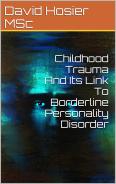Tags
Childhood Trauma: Recovery.
Research shows those who suffer childhood trauma CAN and DO recover.
Making significant changes in life can be a very daunting prospect, but those who do it in order to aid their own recovery very often find the hard work most rewarding.
Some people find making the necessary changes difficult, whereas others find it enjoyable.
THE DECISION TO CHANGE
Change does not occur instantly. Psychologists have identified the following stages building up to change:
1) not even thinking about it
2) thinking about it
3) planning it
4) starting to do it
5) maintaining the effort to continue doing it
THE RECOVERY PROCESS
Each individual’s progress in recovery is unique, but, generally, the more support the trauma survivor has, the quicker the recovery is likely to occur.
Often recovery is not a steady progression upwards – there are usually ups and downs (eg two steps forward…one step back…two steps forward etc) but the OVERALL TREND is upwards (if you imagine recovery being represented on the vertical axis of a graph and time by the horizontal). Therefore, it is important not to become disheartened by set-backs along the recovery path. These are normal.
Sometimes, one can even feel one at first is getting worse (usually if traumas, long dormant, are being processed by the mind in a detailed manner for the first time). However, once the trauma has been properly consciously reprocessed, although this is often painful, it enables the trauma survivor to work through what happened and to form a new, far more positive, understanding of him/herself.
Once the trauma has been reworked (ie understanding what happened and how it has affected the survivor’s development) he or she can start to develop a more positive and compassionate view of him/herself (for example, realizing that the abuse was not their fault can relieve strong feelings of guilt and self-criticism).
Once the reworking phase has been passed through, improvement tends to become more consistent and more rapid.
Many symptoms of childhood trauma may (such as anxiety and negative thinking) may be relieved with hypnotherapy :
TO FIND OUT MORE ABOUT HYPNOSIS, HERE IS A LINK TO A RECOMMENDED HYPNOTHERAPY BLOG TO WHICH THIS SITE IS AFFILIATED : http://www.hypnosisdownloads.com/blog/feed/?a=5719!blog
My next post, to be published soon, will look at why childhood trauma survivors often develop problems in adulthood and the type of problems these are. David Hosier BSc Hons; MSc; PGDE(FAHE).



